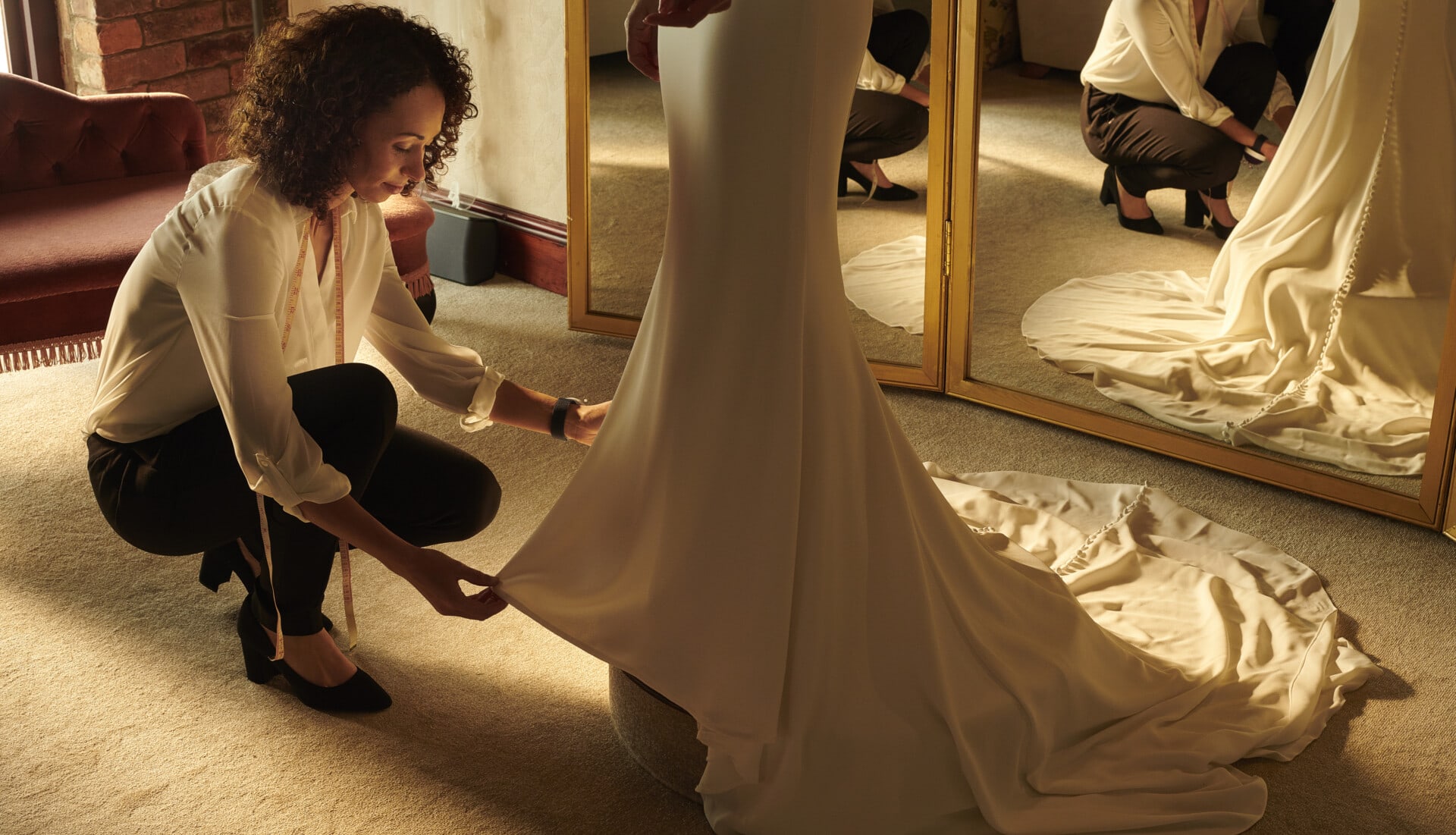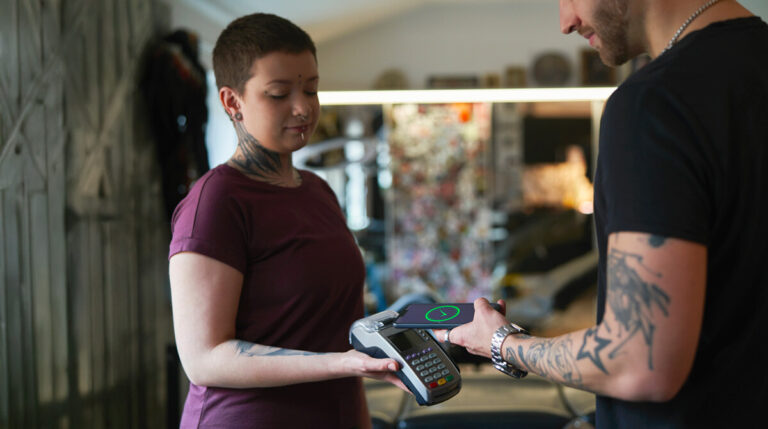If you’re obsessed with fashion trends and wedding planning, starting a bridal store might be perfect for you.
But before you help brides-to-be find their special wedding dress, it’s important to set yourself up for success by researching market trends, choosing an appropriate location, and planning your store layout.
In this article, we’ll cover these topics and more with our 10 essential steps to starting a bridal boutique.
1. Research Market Trends
Fashion trends and wedding styles change every season.
Naturally, you’ll need to stay on top of current trends. Get started by visiting wedding fairs and trade shows where you can meet potential suppliers and experienced bridal store owners.
This is a good opportunity to ask questions about the industry and learn more about how today’s brides are planning their weddings.
Next, look for existing bridal stores that you admire and analyze their website and storefront to get a sense of their aesthetic, style, and value proposition.
This type of competitor analysis is crucial for figuring out what your new store’s identity and target audience is going to be.
Finally, check with friends and family about their wedding experiences, especially those who recently got married or are planning to get married soon.
Ask about their wedding journey and hone in on any pain points that were not addressed by existing wedding vendors.
For example, were there certain dress styles or items that they couldn’t find? Did they perhaps have a hard time getting matching bridesmaids’ dresses?
2. Identify Your Target Bride
A successful bridal store needs to focus on serving its target bride extremely well rather than trying to cater to everyone.
According to Polly Parkin, former owner of The Bride: “High end dresses need to be presented alongside other high end dresses; it’s about deciding on where you want to pitch yourself and creating a clear story.”
At this stage, it’s a good idea to create a persona profile of your target bride based on the following factors:
- Current age
- Current marital status (e.g. single but expecting a proposal, engaged, previously married, etc.)
- Expected time to marriage
- Personal and cultural attitude towards weddings (e.g. do they want a traditional wedding ceremony? Does their family expect a large wedding?)
- Budget range
- Income range
- Location (e.g. urban, suburban, rural)
Narrowing down your target customer will help you construct your bridal store’s value proposition and determine key factors like location and pricing, too.
3. Create A Business Plan
A business plan is a comprehensive document that serves as a roadmap for your small business and helps external parties like investors and lenders understand how your business works.
For a bridal store, you should create a business plan that includes:
- Your store’s name and unique value proposition
- A detailed profile of yourself, including education and work experience
- Your target customer, including demographic, financial, and location data
- Expected startup costs for your store, such as leases, furnishings, inventory, marketing, employees, and legal expenses
- Expected revenue from selling dresses and wedding accessories, along with the average retail markup over wholesale prices
- A detailed marketing plan
- A description of the suppliers you intend to work with
- A description of your inventory (e.g. dresses, accessories, etc.) and inventory management strategy
4. Find A Suitable Location
Unless you’re going with an online-only store, you’ll need a physical location to conduct sales consultations and allow customers to try on potential dresses.
But unlike other small businesses, you don’t necessarily want a location with no competition around. That’s because an area with multiple bridal stores is more likely to attract brides as they can easily shop around for their dress.
In addition, look for other wedding related businesses like cake shops, print shops, beauty salons, and event venues, as these will attract potential brides as well.
Before signing the lease, however, make sure the location matches up with where your target bride lives and prefers to shop, and has enough space to accommodate your inventory, displays, and dressing rooms.
5. Secure Business Licenses and Permits
Next, take the time to apply for a business license and any relevant permits that you may need in your area to operate a bridal store.
Here are the basic licenses and registrations that a bridal store should have:
- Business License: you can obtain a business license from your state’s secretary of state office. If you decide to run your business as a sole proprietor, you should register a business name as well (Doing Business As).
- Employer Identification Number (EIN): this number is used for tax purposes and is issued by the Internal Revenue Service (IRS).
- Sales Tax Permit: when selling products or offering certain services, you may need a state sales tax permit which is issued by the state’s tax department.
- Resale Certificate: when reselling items like dresses, your business may be able to buy inventory tax-free by applying for a resale certificate.
- Certificate of Occupancy: this certificate is required by all businesses to operate within a commercial building. If you’re renting your space, ask your landlord to provide this document.
Contact your local chamber of commerce or municipal government to determine all the necessary licenses required in your area.
6. Furnish Your Bridal Boutique
Once you’ve secured a location, it’s time to decorate the interior.
You’ll want to have an inviting showroom where brides can try on dresses and their friends or family can relax on couches or chairs.
Opt for large, floor-to-ceiling mirrors at different angles for the dressing stage and make sure the dressing area is closed off from the main portion of the shop.
In terms of design, go with an overall theme that matches your bridal store’s business plan and target clientele.
According to design consultancy Design CLD, bridal boutiques can choose from four unique themes: romantic, natural, modern, and classic.
7. Find The Right Designers
Once your store is ready, it’s time to find and source high quality wedding gowns from in-demand designers.
It’s important to conduct as much research as possible on vendors as you’ll want to build long-term relationships with good designers.
You may want to avoid designers that your competitors already carry – in fact, designers may not work with you if they supply another bridal store in your area.
Bridal business consultant Jane Watson recommends starting with four collections with around 40-50 samples in total so you have a good representation of designs from each supplier.
So, where do you find the right designers?
Look for them at industry trade shows, wedding magazines, and increasingly, on various online marketplaces.
8. Hire Sales Consultants and Assistants
While some bridal store owners operate solo, you may want to hire additional staff to help with customer consultations and manage store operations.
Look for sales consultants with previous experience in retail or customer service with a knack for fashion and design.
In addition, consider hiring an assistant to retrieve and hang dresses, serve drinks, and keep the shop tidy.
9. Set Up Marketing Initiatives
As a bridal store, your marketing efforts need to be targeted and consistent across both online and offline channels.
Start by creating a website that shows off your store and brand promise. Over time, you can also add photos or testimonials from previous clients and write blog posts to drive potential leads to your store.
Next, social media is an excellent channel for building brand awareness. Bridal brands tend to perform well on visual platforms like Instagram and Pinterest, so make sure to snap quality photos or hire a professional photographer to create stunning images.
Finally, don’t forget to invest in traditional offline channels as well. Word of mouth and referral marketing are extremely powerful for generating new leads.
A “Refer a Friend” program for your customers has a lot of potential – brides-to-be often have friends that get engaged soon after. You can also explore partnerships with wedding venues, photographers, and florists for mutual referrals.
10. Manage Your Bridal Store with Poppy Bridal
Starting a bridal store is a challenging but incredibly rewarding endeavor – your wedding dresses can bring a lot of happiness to your customers.
Now that you know how to get started, manage your bridal business efficiently with Poppy Bridal, a bridal software program that integrates appointment bookings, inventory management, and customer communications all in one place.
With Poppy Bridal, your customers can browse and provide feedback on dresses while you get to stock your inventory from hundreds of designers and private label suppliers.
Schedule a demo today to find out why Poppy Bridal is the preferred software solution for bridal boutiques. Also, check out Gravity’s payment processing services for bridal stores.




